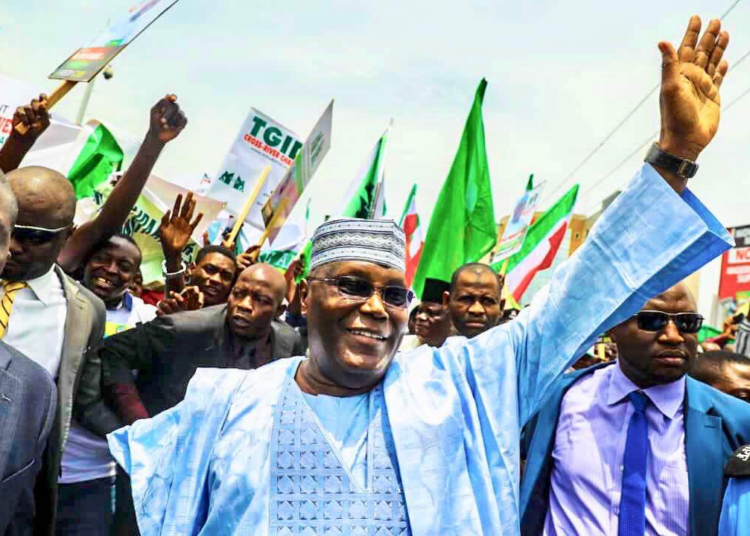Here we go again. Former Vice President Atiku Abubakar has packed his political bags once more, this time pitching his tent with the African Democratic Congress (ADC). The man who has made party-hopping an art form is at it again, and predictably, Nigerians are having a field day with their criticisms.
“Is it by force to be president?” they ask. “Doesn’t he know it’s the South’s turn?” others wonder.
Even I have taken my fair share of swipes at the Waziri of Adamawa on this very page. But today, I want to take a different approach entirely.
Let me ask a simple question: Does Atiku Abubakar have the constitutional right to contest for the presidency? Absolutely yes! Does our constitution specify how many times a citizen can run for president? Absolutely not. So why are we acting like the man committed a crime by nursing a lifelong ambition?
The truth is, Atiku’s latest political somersault shouldn’t surprise anyone who has been paying attention to Nigerian politics since 1999. This is a man who has contested for president more times than most people change their phones. From PDP to AC to APC, back to PDP, and now to ADC – the man has practically toured every major political party in Nigeria. If there were an award for political tourism, Atiku would be the undisputed champion.
But here’s what I find amusing about our collective outrage: we’re applying moral standards to a game that has never been moral. Politics, especially Nigerian politics, is not a Sunday school class. It’s a contact sport where loyalty is often measured in electoral cycles and principles are as flexible as rubber bands.
Critics are quick to point out that Atiku is being selfish, that he should step aside for younger candidates, that he’s blocking the path for others.
Really? Since when did Nigerian politics become a charity organisation? Show me one politician – just one – who stepped aside because it was someone else’s “turn” when they had a realistic chance of winning.
The narrative that 2027 “belongs” to the South is particularly interesting. Where exactly is this written in our constitution? Nowhere. Rotational presidency is nothing more than a gentleman’s agreement that has been honoured more in breach than in observance.
Let’s refresh our memories. In 2011, when the narrative was that the North should complete Umaru Yar’Adua’s term, did Goodluck Jonathan step aside? No, he didn’t. He contested and won. When the same Jonathan ran again in 2015, despite northern sentiments, did anyone declare the election invalid? Of course not.
Even in 2023, with all the noise about power shifting to the South after Buhari’s eight years, Atiku still polled nearly 7 million votes. Think about that for a moment. With the entire country supposedly agreeing that it was the South’s turn, this man still managed to emerge as the second-highest vote-getter. He lost by just about 2 million votes to President Tinubu. That tells you something about how many Nigerians view this rotational presidency arrangement.
The ADC coalition that Atiku has joined was tailor-made for his 2027 ambitions, much like the APC merger in 2013 was designed to realize Muhammadu Buhari’s presidential dreams. And guess what? I can confidently predict that Atiku will clinch the ADC ticket ahead of all other aspirants. The man didn’t jump parties to play second fiddle.
Some argue that at his age, Atiku should be mentoring younger politicians instead of chasing his presidential dreams. But who made that rule? Since when did we start putting age limits on ambition? If the man believes he has what it takes to govern Nigeria at 80 or even 100, that’s between him and the Nigerian electorate.
The beautiful thing about democracy is that it gives power to the people. If Nigerians truly believe Atiku is too old, has changed parties too many times, or is standing in the way of Southern presidency, they have a simple remedy: don’t vote for him. Democracy is self-correcting that way.
But let’s be honest about what irks people about Atiku’s persistence. It’s not his age or his party-switching. It’s his refusal to conform to our expectations of political retirement.
We expect our politicians to gracefully bow out after a few failed attempts, to read the room and step aside. Atiku has refused to play by these unwritten rules, and that drives people crazy.
There’s also this underlying assumption that somehow, Atiku’s continued participation diminishes the chances of other candidates. This is a very strange way to view democracy. By that logic, shouldn’t every candidate step aside for the “most deserving” one? Who determines this desert anyway?
The man has been dreaming of becoming president since the return of democracy in 1999. That’s 25 years of consistent ambition. You might call it stubbornness, delusion, or even obsession, but you cannot question his right to keep trying.
After all, democracy thrives on choices, and Atiku represents one of those choices, however unpopular it might be to some.
Moreover, let’s not pretend that Nigerian elections have ever truly respected geographical rotation. Every election cycle, we see candidates from all regions throwing their hats in the ring, regardless of prevailing sentiments. The 2023 election was a perfect example – despite the supposed agreement on Southern presidency, we had Peter Obi from the Southeast, Tinubu from the Southwest, and Atiku from the Northeast all in the race.
The reality is that no region can single-handedly produce a president in Nigeria. Even President Buhari, who consistently garnered over 12 million votes from the North, couldn’t win in 2003, 2007, and 2011 until he got substantial Southern support in 2015. Politics is about building coalitions across ethnic and regional lines, not about taking turns.
If anything, Atiku’s persistence should be a lesson to younger politicians. The man refuses to give up on his dreams, regardless of public opinion or conventional wisdom. That’s either admirable determination or legendary stubbornness, depending on your perspective.
As we approach 2027, instead of wasting energy criticizing Atiku’s decision to contest, we should focus on the real issues. What does he offer Nigeria? What’s his blueprint for tackling insecurity, poverty, and unemployment? How does he plan to fix our epileptic power supply and diversify the economy? These are the questions that matter, not whether he has contested too many times or switched parties too often.
The man has every constitutional right to keep contesting until he’s satisfied. If Nigerians don’t want him, they know what to do – vote for someone else. That’s how democracy works. Let the man be, and let the people decide.
After all, in a country where politicians promise heaven and earth during campaigns only to deliver hell after winning, maybe we need someone whose only consistent promise is his unwavering determination to be president. At least with Atiku, we know exactly what we’re getting – a man who simply refuses to quit. Whether that’s what Nigeria needs right now is a different conversation entirely.





